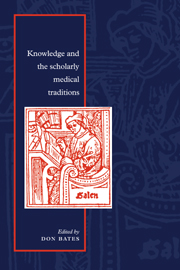Book contents
- Frontmatter
- Contents
- List of illustrations
- List of contributors
- Acknowledgements
- 1 Scholarly ways of knowing: an introduction
- Part 1 Scholarly medicine in the West
- 2 Epistemological arguments in early Greek medicine in comparativist perspective
- 3 Autopsia, historia and what women know: the authority of women in Hippocratic gynaecology
- 4 The growth of medical empiricism
- 5 Scholarship and social context: a medical case from the eleventh-century Near East
- 6 The experience of the book: manuscripts, texts, and the role of epistemology in early medieval medicine
- 7 Artifex factivus sanitatis: health and medical care in medieval Latin Galenism
- 8 Epistemology and learned medicine in early modern England
- Part 2 Chinese traditional medicine
- Part 3 Āyurvedic medicine
- Part 4 Commentaries
- Index
4 - The growth of medical empiricism
Published online by Cambridge University Press: 01 February 2010
- Frontmatter
- Contents
- List of illustrations
- List of contributors
- Acknowledgements
- 1 Scholarly ways of knowing: an introduction
- Part 1 Scholarly medicine in the West
- 2 Epistemological arguments in early Greek medicine in comparativist perspective
- 3 Autopsia, historia and what women know: the authority of women in Hippocratic gynaecology
- 4 The growth of medical empiricism
- 5 Scholarship and social context: a medical case from the eleventh-century Near East
- 6 The experience of the book: manuscripts, texts, and the role of epistemology in early medieval medicine
- 7 Artifex factivus sanitatis: health and medical care in medieval Latin Galenism
- 8 Epistemology and learned medicine in early modern England
- Part 2 Chinese traditional medicine
- Part 3 Āyurvedic medicine
- Part 4 Commentaries
- Index
Summary
Over the past few years, historians of Greek philosophy have become increasingly aware of the importance of the Greek medical tradition for the understanding of ancient philosophy. Of course, the voluminous medical literature of late antiquity, from Galen on, has long been recognized as invaluable as a second-hand source of information regarding the doctrines of philosophers, most notably those from the early Stoa, which have otherwise perished in the wreckage of history. But more recently scholars have turned to the medical writings as sources for philosophy in their own right. They have come to see the great epistemological debates that formed the core of Hellenistic philosophy as being prosecuted just as vigorously in the medical schools as in the groves of Academe. That debate is the principal focus of this paper: but it is worth first briefly sketching the long history of Greek philosophical medicine.
Among the earliest Presocratics, Alcmaeon of Croton (fl. c. 575 BC) was a man of both medical and philosophical interests, giving an account of the physiology of perception, and of concept-formation. A century later, Empedocles combined a reputation for abstract physical speculation with a certain réclame as a medical man, and he too was interested in cognition and perception. Equally, several early Hippocratic texts deal with philosophical questions concerning the nature of knowledge and explanation. Later doctors of importance to the development of philosophical methodology include Herophilus and Erasistratus (fl. c. 260 BC), Asclepiades of Bithynia (fl. c. 120 BC), and Galen.
But perhaps the strongest and most durable connections are those which developed between Empiricist medical epistemology and Scepticism.
- Type
- Chapter
- Information
- Knowledge and the Scholarly Medical Traditions , pp. 60 - 83Publisher: Cambridge University PressPrint publication year: 1995
- 6
- Cited by

